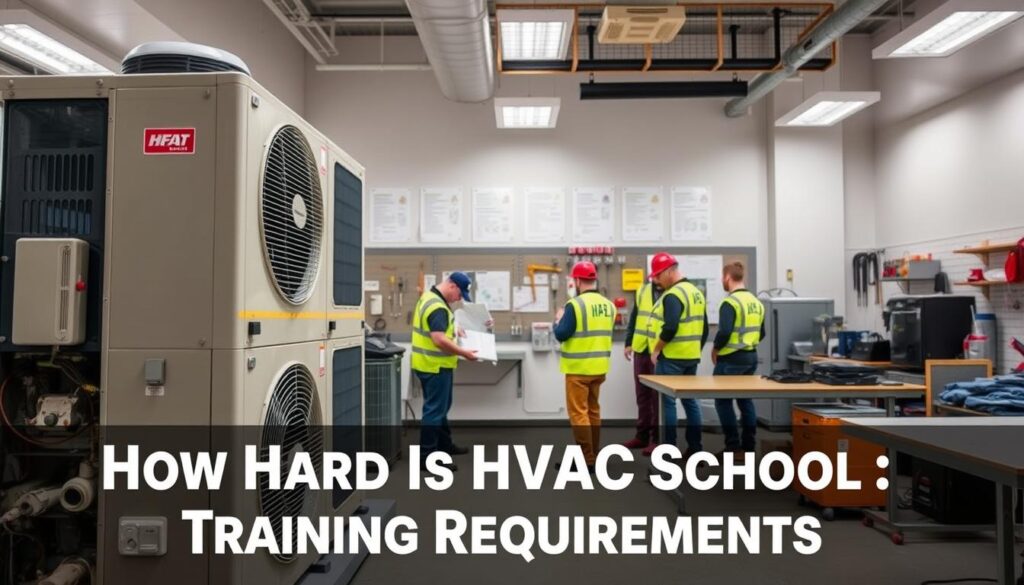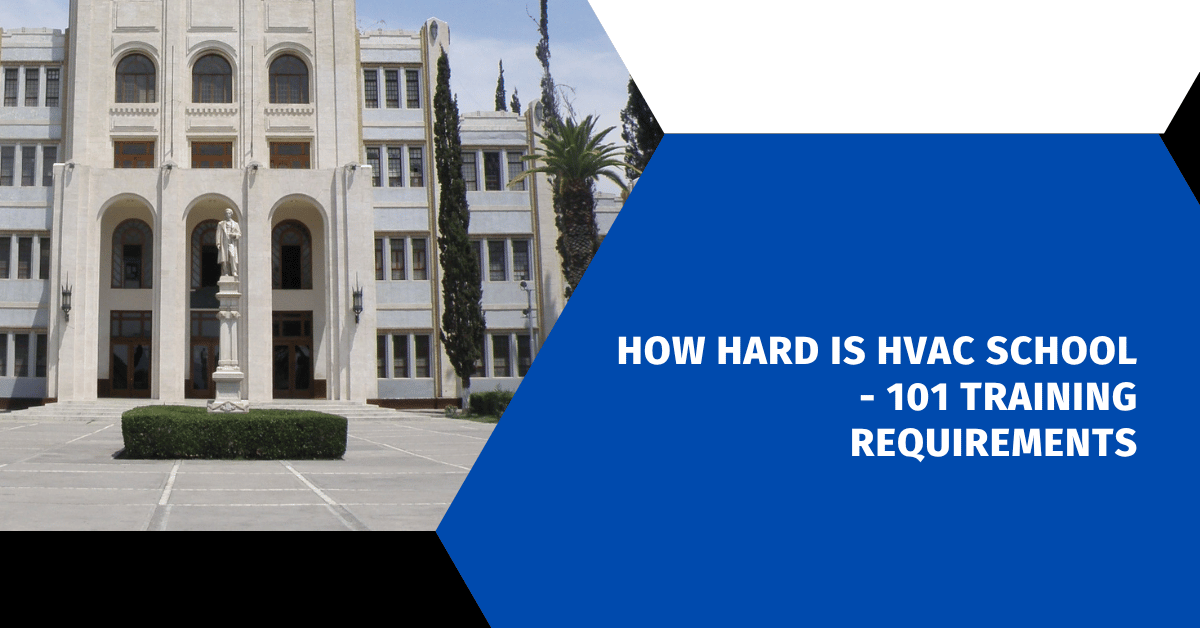Affiliate Disclosure
HVAC Guide Guys is a participant in the Amazon Services LLC Associates Program, an affiliate advertising program designed to provide a means for sites to earn advertising fees by advertising and linking to Amazon.
How Hard Is HVAC School? Are you curious about HVAC training programs? They can challenge your skills and push you out of your comfort zone. The HVAC field is exciting, combining technical knowledge with hands-on problem-solving.

The Bureau of Labor Statistics shows a bright future for HVAC technicians. They earn a median of $50,590 a year. Plus, the job is expected to grow 5% from 2020 to 2030. This makes HVAC a stable and rewarding career for those who invest in their education.
So, how hard is HVAC school? It’s challenging but rewarding. You’ll learn a lot and become a skilled professional. HVAC programs mix classroom learning with practical skills, preparing you for a fulfilling career.
Learning HVAC involves mastering complex systems and understanding electrical circuits. You’ll also develop problem-solving skills that go beyond classroom learning. The journey might be tough, but the rewards of being an HVAC technician are worth it.
Key Takeaways
- HVAC training offers a promising career with strong job growth.
- Programs typically last from 6-24 months.
- HVAC technicians earn a median of $50,590 a year.
- Hands-on training is key in HVAC education.
- Technical skills and problem-solving abilities are vital for success.
- Certification and continuous learning are important for career growth.
Table of Contents
Understanding HVAC Career Basics and Prerequisites
Starting a career in HVAC needs careful planning and a strong educational base. To become an HVAC technician, you must first grasp the basic needs and skills for success in this field.
High School Diploma Requirements
Your HVAC career begins with education. You need a high school diploma or GED to start HVAC certification programs. Most employers and training places want candidates with a basic secondary education.
- Minimum education: High school diploma or equivalent
- Preferred academic background: Strong math and science skills
- Key subjects: Physics, Chemistry, Mathematics
Essential Academic Skills for Success
HVAC skills require more than just classroom learning. You must develop critical thinking and problem-solving skills. Knowing algebra and geometry well is key for understanding HVAC systems.
| Academic Skill | Importance in HVAC |
|---|---|
| Mathematics | Calculating load requirements, system specifications |
| Physics | Understanding thermodynamics and energy transfer |
| Computer Skills | Reading digital diagnostics and using technical software |
Basic Technical Knowledge Needed
To meet HVAC certification needs, you should know the basics of mechanical systems. Knowing electrical parts, refrigeration cycles, and basic troubleshooting will help you stand out.
“Success in HVAC is about continuous learning and adapting to new technologies.” – HVAC Industry Expert
Getting ready for HVAC certification might include learning blueprint reading, basic electrical systems, and safety rules. Many training programs offer detailed courses that teach these key skills. This ensures you’re ready for a successful HVAC career.
Explore Our HVAC Shop
Looking for top-rated HVAC tools, parts, and accessories? Visit our shop and find the perfect solution for your needs.
Visit the ShopTwo Main Paths to Becoming an HVAC Technician
Exploring hvac career preparation reveals two main paths to becoming an HVAC technician. Each path has its own benefits and hurdles for those entering the heating, ventilation, and air conditioning field.
Path 1: On-the-Job Training
One way to start is by joining the HVAC workforce directly. Many companies offer apprenticeships that let you learn while you work. On-the-job training usually lasts 1-2 years. You’ll get real-world experience with seasoned technicians.
- Immediate employment
- Earn while you learn
- Hands-on practical experience
- No upfront educational expenses
Path 2: Formal HVAC Training Programs
For those ready to tackle hvac trade school challenges, formal education is the way. These programs last 6-10 months and cover all the technical bases. For example, Universal Technical Institute’s programs can be finished in under nine months.
- Structured curriculum
- Classroom and laboratory training
- Preparation for industry certifications
- Potential for higher starting wages
“Choose the path that best aligns with your learning style and career goals.” – HVAC Career Advisor
Whichever path you choose, getting key certifications like EPA Section 608 is essential. Also, consider extra credentials to boost your appeal in the HVAC market.
Duration and Time Commitment of HVAC Training
Knowing how long HVAC training takes is key for those thinking about a career in this field. Your path to becoming an HVAC technician can vary. Each option has its own time needs and learning chances.
The time needed for HVAC studies changes based on your training choice. Let’s look at the different paths and how long they take:
Certificate Program Timeline
Certificate programs are the fastest way to start in HVAC. These programs usually last:
- 6 months to 1 year
- They focus on specific skills
- They quickly lead to entry-level jobs
Associate Degree Duration
An associate degree gives a deeper education. These programs need:
- About 2 years of full-time study
- They cover more technical and theoretical topics
- They open doors to better career chances
| Program Type | Duration | Key Features |
|---|---|---|
| Certificate Program | 6-12 months | Quick entry, basic skills |
| Associate Degree | 2 years | Comprehensive training, advanced skills |
Apprenticeship Length Requirements
Apprenticeships are the longest commitment, lasting:
- 4-5 years of classroom and on-the-job training
- They mix paid work with learning
- They offer full skill development with expert guidance
“The journey of an HVAC technician is as much about dedication as it is about technical skill.” – Industry Expert
Your choice depends on your career goals, available time, and how you learn best. Each path has its own benefits for a successful HVAC career.
Explore Our HVAC Shop
Looking for top-rated HVAC tools, parts, and accessories? Visit our shop and find the perfect solution for your needs.
Visit the ShopHow Hard Is HVAC School: A Realistic Assessment
Getting into HVAC school means you’re ready for a tough but fulfilling career. The school’s difficulty level can vary. But, it’s all about being dedicated, having a knack for technical stuff, and being eager to learn about complex systems.
When you think about how hard HVAC school is, you’ll face a few big challenges:
- Basic math skills
- Grasping technical ideas
- Dealing with the physical side of hands-on training
- Learning safety rules
“Success in HVAC training comes from consistent effort and practical engagement with the material.” – Professional HVAC Instructor
But HVAC school is more than just sitting in class. You’ll also need to:
- Read technical drawings
- Do precise measurements
- Fix complex mechanical issues
- Get electrical circuits
Students usually find the program tough but doable with good prep. Your success will depend on your dedication to learning and honing your technical skills.
| Skill Area | Difficulty Level | Key Requirements |
|---|---|---|
| Mathematical Skills | Moderate | Basic algebra, geometry |
| Technical Understanding | High | System comprehension, diagnostic skills |
| Physical Demands | Challenging | Strength, agility, working in varied environments |
Pro tip: Approach HVAC school with a growth mindset. Your willingness to learn and adapt will be your greatest asset in mastering this technical field.
Core Curriculum and Technical Skills Training
HVAC training programs offer a mix of classroom learning and hands-on practice. You’ll learn to develop key technical skills and understand complex systems.
Starting in HVAC, you’ll see how challenging it is. The coursework is tough, but it prepares you for real-world problems.
Classroom Theoretical Components
In class, you’ll learn about important technical topics. These include:
- Refrigeration principles and components
- Electrical systems and motor controls
- Load calculation and duct design
- Industrial safety protocols
Hands-on Training Elements
Hands-on training is key to your growth. You’ll get lots of practical experience, including:
- Tube and pipe fabrication techniques
- Equipment installation and maintenance
- Diagnostic troubleshooting exercises
- Real-world simulation scenarios
“Practical experience transforms theoretical knowledge into professional expertise.” – HVAC Industry Expert
Safety Protocol Education
Safety training is a big part of HVAC education. You’ll learn important safety rules to keep yourself and others safe.
With up to 1,040 hours of training, you’ll get the skills to succeed. The job market is growing, with a 12.5% increase expected. This means great career opportunities for those who are well-trained.
Explore Our HVAC Shop
Looking for top-rated HVAC tools, parts, and accessories? Visit our shop and find the perfect solution for your needs.
Visit the ShopCost Investment and Financial Considerations

Getting into hvac training needs smart financial planning. Costs can vary from $1,500 to $30,000, based on your path. Knowing the financial side is key for a good hvac career.
Here’s what you might pay for different programs:
- Certificate Programs: $1,200 – $15,000
- Associate Degree Programs: $15,000 – $35,000
- Apprenticeship Programs: $500 – $2,000
But there’s more to think about than just tuition:
| Expense Category | Estimated Cost |
|---|---|
| Books and Supplies | $500 – $1,000 |
| Tools and Equipment | $500 – $3,000 |
| Certification Exam Fees | $200 – $500 |
Financial aid can help a lot. Look into these options:
- Scholarships
- Grants
- Federal Student Loans
- Workforce Innovation and Opportunity Act (WIOA) grants
- Employer-sponsored training programs
“Investing in your HVAC education is investing in a stable, high-demand career with promising job prospects.” – Industry Expert
Community colleges usually cost less than private schools. Some offer payment plans to help you budget your education.
Licensing and Certification Requirements by State
Getting an HVAC certification can be tricky because each state has its own rules. It’s important to know these rules to grow your career and follow the law in the HVAC field.
To become a licensed HVAC pro, you need to follow a few steps. You must show you have the right skills and get the correct certifications.
EPA Certification Essentials
The Environmental Protection Agency (EPA) requires all HVAC techs to have a universal certification for refrigerants. You need Section 608 certification to legally work with refrigerants.
- Type I: Small appliances
- Type II: High-pressure appliances
- Type III: Low-pressure appliances
- Universal: Covers all refrigerant types
State-Specific Licensing Variations
HVAC licenses vary a lot from state to state. For example:
- California requires 4 years of documented experience
- Arizona mandates 4 years of specialty experience
- Alabama needs 3,000 hours of supervised work
- Connecticut offers 21 different licensing categories
NATE Certification Options
NATE certification is not required but shows you have top-notch skills. It boosts your professional image and job chances.
“Certification is not just a piece of paper – it’s proof of your commitment to professional excellence.” – HVAC Industry Expert
Always check your state’s rules to make sure you meet local HVAC certification laws.
Explore Our HVAC Shop
Looking for top-rated HVAC tools, parts, and accessories? Visit our shop and find the perfect solution for your needs.
Visit the ShopCareer Opportunities and Salary

The HVAC industry is booming, with 441,200 jobs available in 2023. It’s a great field for those interested in technical trades. With the right skills, you can have a rewarding career in HVAC.
Salaries in HVAC are impressive. The median annual salary is $57,300. Experienced technicians can earn even more. Entry-level jobs start at $22.47 per hour, while experienced ones can reach up to $32.83 hourly.
“The HVAC industry provides stable, well-paying careers with excellent growth opportunities,” says industry experts.
Some of the best places to work in HVAC include:
- California
- Florida
- Ohio
- Texas
- Illinois
The Bureau of Labor Statistics predicts a 9% job growth by 2033. This shows a strong demand for HVAC professionals in many sectors.
| Experience Level | Hourly Wage | Annual Salary |
|---|---|---|
| Entry-Level | $22.47 | $46,740 |
| Mid-Level | $27.55 | $57,300 |
| Senior-Level | $32.83 | $68,290 |
Aspiring HVAC technicians can look forward to a dynamic career with opportunities for continuous learning and growth.
Apprenticeship vs. School-Based Training Programs
Choosing between apprenticeship and school-based hvac training programs is tough for those wanting to be HVAC technicians. Both ways have their own benefits in tackling hvac trade school challenges. They also help prepare for a career in the HVAC field.
“Experience is the best teacher in the HVAC world” – Industry Veteran
Apprenticeship programs mix practical work with classroom learning. Here are the main differences between these two training paths:
| Apprenticeship | School-Based Training |
|---|---|
| Earn while you learn | Full-time educational commitment |
| 2-5 years training duration | 9-24 months program length |
| Direct industry experience | Structured classroom learning |
| Immediate job placement possible | Certification-focused curriculum |
Apprentices get:
- Earning $15-$20 per hour during training
- Direct mentorship from experienced technicians
- Reduced student debt
- Faster skill development
School-based programs offer:
- Structured EPA certification preparation
- Comprehensive theoretical knowledge
- Networking opportunities
- Flexible learning environments
Your choice depends on your learning style, financial situation, and career goals. Both paths can lead to successful HVAC careers.
Essential Tools and Equipment for HVAC Students
Starting your HVAC career means building a solid toolkit. This toolkit is key for mastering the technical skills needed. As a student, you’ll need to invest in the right equipment for your hands-on learning.
Spending $200 to $500 on tools is a good start, depending on your needs. HVAC pros say to begin with a basic set of tools. These tools will be your go-to throughout your career.
- Insulated screwdrivers
- Digital multimeters
- Pliers and wire cutters
- Tape measures
- Pipe wrenches
- Safety gloves
- Cordless drill
While some tools like vacuum pumps are provided by employers, you’ll need to know the basics. The U.S. Bureau of Labor Statistics says HVAC jobs will keep growing. So, investing in tools is a smart move for your career.
“Your toolkit is more than just equipment—it’s your professional foundation in the HVAC industry.”
As an apprentice, you’ll get tools as you learn. HVAC tech keeps evolving, so you’ll need to keep learning and updating your tools. Tools like thermal imaging devices and advanced multimeters will become essential as you grow in your skills.
Conclusion
Starting an HVAC career means you must think about how challenging HVAC school can be. The path to becoming an HVAC technician takes 10 months to 2 years. Success depends on your hard work, technical skills, and readiness for physical and mental challenges.
Getting ready for an HVAC career is more than just studying. You’ll need to improve your problem-solving, attention to detail, and physical strength. The HVAC field offers great chances for those who put in the effort to learn. You can choose from vocational schools, certificate programs, or apprenticeships.
Your success in HVAC depends on always learning and being flexible. This career offers job security, growth chances, and the chance to work with new technologies. Getting licensed, certified, and developing practical skills will help you stand out in a competitive job market.
Knowing how hard HVAC school can be is key to your success. By picking a good training program and staying dedicated, you can turn your passion into a lasting career in HVAC.
FAQ
How difficult is HVAC school compared to other technical training programs?
What are the minimum educational requirements to enter an HVAC training program?
How long does it typically take to complete HVAC training?
What are the primary challenges students face in HVAC school?
What certifications will I need after completing HVAC training?
How much does HVAC training typically cost?
How difficult is HVAC school compared to other technical training programs?
What are the minimum educational requirements to enter an HVAC training program?
How long does it typically take to complete HVAC training?
What are the primary challenges students face in HVAC school?
What certifications will I need after completing HVAC training?
How much does HVAC training typically cost?
FAQ
How difficult is HVAC school compared to other technical training programs?
HVAC school is moderately challenging. It combines academic learning with practical training. You’ll need to understand math, mechanical systems, and solve problems well. It’s tough but designed for those who really want to learn technical skills.
What are the minimum educational requirements to enter an HVAC training program?
You need a high school diploma or GED to start HVAC training. Good math, physics, and computer skills help a lot. Some programs also test your technical knowledge before you begin.
How long does it typically take to complete HVAC training?
The time it takes to finish HVAC training varies. Certificate programs last 6-12 months, associate degrees take 2 years, and apprenticeships can be 3-5 years. It depends on how many hours you study each week and the program’s requirements.
What are the primary challenges students face in HVAC school?
Students face tough technical concepts, hands-on training, and learning new tools. You’ll study electrical systems, thermodynamics, and refrigeration. It’s mentally and physically demanding.
What certifications will I need after completing HVAC training?
You’ll need EPA Section 608 Certification for refrigerants. NATE certification can also boost your career. Check your state’s licensing rules for more details.
How much does HVAC training typically cost?
HVAC training costs vary. Certificate programs start at
FAQ
How difficult is HVAC school compared to other technical training programs?
HVAC school is moderately challenging. It combines academic learning with practical training. You’ll need to understand math, mechanical systems, and solve problems well. It’s tough but designed for those who really want to learn technical skills.
What are the minimum educational requirements to enter an HVAC training program?
You need a high school diploma or GED to start HVAC training. Good math, physics, and computer skills help a lot. Some programs also test your technical knowledge before you begin.
How long does it typically take to complete HVAC training?
The time it takes to finish HVAC training varies. Certificate programs last 6-12 months, associate degrees take 2 years, and apprenticeships can be 3-5 years. It depends on how many hours you study each week and the program’s requirements.
What are the primary challenges students face in HVAC school?
Students face tough technical concepts, hands-on training, and learning new tools. You’ll study electrical systems, thermodynamics, and refrigeration. It’s mentally and physically demanding.
What certifications will I need after completing HVAC training?
You’ll need EPA Section 608 Certification for refrigerants. NATE certification can also boost your career. Check your state’s licensing rules for more details.
How much does HVAC training typically cost?
HVAC training costs vary. Certificate programs start at $1,200, while associate degrees can cost up to $30,000. Community colleges are often cheaper. Look for financial aid and scholarships to help pay.
What technical skills will I learn during HVAC training?
You’ll learn about system installation, maintenance, and troubleshooting. You’ll also study electrical circuits, refrigeration, and safety. You’ll work with different HVAC systems and learn to diagnose and fix problems.
Is physical fitness important for HVAC technicians?
Yes, HVAC work is physically demanding. You’ll need strength, flexibility, and stamina for the job. Being in good shape helps prevent injuries and makes the work easier.
What are the career prospects after completing HVAC training?
HVAC has good job prospects, with 5% growth expected by 2029. You can work in homes, businesses, or industries. Starting salaries are around $35,000 to $50,000, with more experience leading to higher pay.
,200, while associate degrees can cost up to ,000. Community colleges are often cheaper. Look for financial aid and scholarships to help pay.
What technical skills will I learn during HVAC training?
You’ll learn about system installation, maintenance, and troubleshooting. You’ll also study electrical circuits, refrigeration, and safety. You’ll work with different HVAC systems and learn to diagnose and fix problems.
Is physical fitness important for HVAC technicians?
Yes, HVAC work is physically demanding. You’ll need strength, flexibility, and stamina for the job. Being in good shape helps prevent injuries and makes the work easier.
What are the career prospects after completing HVAC training?
HVAC has good job prospects, with 5% growth expected by 2029. You can work in homes, businesses, or industries. Starting salaries are around ,000 to ,000, with more experience leading to higher pay.

